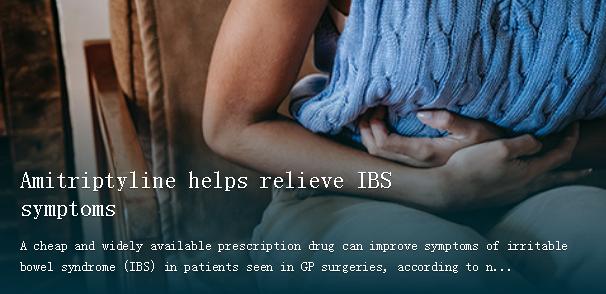博文
阿米替林有助于缓解 IBS 症状
||
阿米替林有助于缓解 IBS 症状
诸平
据英国南安普顿大学(University of Southampton)2023年10月17日提供的消息,南安普顿大学和英国利兹大学(University of Leeds)领导的一项新研究表明,一种廉价且广泛使用的处方药可以改善全科医生手术患者的肠易激综合症(irritable bowel syndrome简称IBS)症状即阿米替林(Amitriptyline)有助于缓解 IBS 症状(Amitriptyline helps relieve IBS symptoms)。
阿米替林通常以低剂量用于治疗一系列健康问题,根据亚特兰蒂斯(ATLANTIS)试验的结果,阿米替林也被发现可以改善IBS症状。
该研究由利兹大学、南安普顿大学和英国布里斯托尔大学(University of Southampton)的研究人员领导,并由英国国家健康与护理研究所 (National Institute for Health and Care Research 简称NIHR)资助,在初级保健领域进行。全科医生(GPs)开出药物,患者根据症状的严重程度,使用为试验设计的调整文件来管理自己的剂量。大多数IBS患者都由全科医生在初级保健机构就诊和管理,这意味着这项试验的结果可能适用于许多患有这种疾病的人。
2023年10月16日发表在《柳叶刀》(The Lancet)上的结果表明,服用阿米替林的患者报告症状总体改善的可能性几乎是服用安慰剂的患者的两倍。原文详见Prof Alexander C Ford, Alexandra Wright-Hughes, Sarah L Alderson, Pei-Loo Ow, Prof Matthew J Ridd, Prof Robbie Foy, Gina Bianco, Prof Felicity L Bishop, Matthew Chaddock, Heather Cook, Deborah Cooper, Catherine Fernandez, Prof Elspeth A Guthrie, Suzanne Hartley, Amy Herbert, Daniel Howdon, Delia P Muir, Taposhi Nath, Sonia Newman, Thomas Smith, Christopher A Taylor, Emma J Teasdale, Ruth Thornton, Amanda J Farrin, Prof Hazel A Everitt. Amitriptyline at Low-Dose and Titrated for Irritable Bowel Syndrome as Second-Line Treatment in primary care (ATLANTIS): a randomised, double-blind, placebo-controlled, phase 3 trial. The Lancet, Published:October 16, 2023. DOI: https://doi.org/10.1016/S0140-6736(23)01523-4
https://www.thelancet.com/journals/lancet/article/PIIS0140-6736(23)01523-4/fulltext
现在,试验团队建议全科医生支持IBS患者使用阿米替林来控制症状,并已向临床医生和患者提供剂量调整文件。
“有效治疗”(‘Effective treatment’)
联合首席研究员、利兹大学医学院(University of Leeds’s School of Medicine)胃肠病学教授亚历山大·福特 (Alexander Ford) 表示:“阿米替林是治疗IBS的有效方法,安全且耐受性良好。这项新的严格研究表明,全科医生应该为患者提供初级治疗支持。如果推荐的一线治疗方法未改善IBS症状,请尝试使用低剂量阿米替林。”
IBS影响全球约5%的人,会导致腹痛和排便改变。这种长期病症尚无已知的治愈方法,其严重程度会随着时间的推移而波动。它会对生活质量以及工作和社交能力产生重大影响。大多数治疗效果有限,而且人们常常会出现持续的麻烦症状。
阿米替林属于一组称为三环类的药物。最初以高剂量用于治疗抑郁症,如今很少用于治疗这种疾病,因为已经开发出了新的治疗方法。
之前的小剂量三环类抗抑郁药(tricyclic antidepressants)治疗IBS的小型试验表明,对于在医院诊所就诊的患者可能有好处,这些患者通常有更难以治疗的症状,但这项新研究是第一个低剂量阿米替林与安慰剂片剂的随机对照试验用于初级保健中的IBS。这也是全球规模最大的阿米替林治疗IBS试验。
全科医生已经开出低剂量阿米替林来治疗慢性神经痛和背痛,并帮助预防偏头痛发作。英国国家临床医学研究所(NICE)指南目前指出,全科医生可以考虑使用低剂量三环类药物(如阿米替林)治疗IBS,但到目前为止,其益处的证据尚不确定。
本次试验结果表明阿米替林具有明显的益处,如果一线治疗后症状没有改善,全科医生可以向IBS患者提供低剂量阿米替林,作为共同决策的一部分。
“有益的良好证据”(‘Good evidence of benefit’)
南安普顿大学初级保健研究中心(Primary Care Research Centre, University of Southampton)的初级保健研究教授、联席首席研究员黑兹尔·埃弗里特(Hazel Everitt)表示:“在ATLANTIS 之前,由于研究证据不确定,全科医生并不经常开阿米替林治疗IBS,但我们的新研究提供了良好的益处证据。
全科医生已经为其他病症开出了低剂量阿米替林,例如慢性疼痛和睡眠质量差,当我们作为这项研究的一部分采访全科医生时,如果参与者也热衷于有另一种选择来尝试,他们愿意为IBS患者开处方,用阿米替林来帮助他们的IBS症状治疗,大多数人很乐意根据症状和副作用自我调整剂量。”
ATLANTIS试验由英国国家卫生研究院(NIHR)健康技术评估计划(NIHR Heath Technology Assessment programme)资助(National Institute for Health and Care Research Health Technology Assessment Programme grant reference 16/162/01)。来自英国三个地区——西约克郡(West Yorkshire)、威塞克斯(Wessex)和英格兰西部(West of England)——的约463名IBS患者参加了此次活动。他们是从55个全科诊所招募的。
参与者被随机分为两组——接受阿米替林组和接受安慰剂组。参与者控制他们服用了多少片试验药物,通过患者剂量调整文件获得支持,该文件是由患者代表特别为该试验开发的。这使得参与者能够根据他们的IBS症状和经历的任何副作用来增加或减少片剂的数量。
服用阿米替林的参与者报告称,与服用安慰剂的参与者相比,六个月后他们的症状评分有更大的改善。服用阿米替林的患者报告IBS症状总体改善的可能性几乎是服用安慰剂的患者的两倍,而且阿米替林在广泛的IBS症状测量中表现更好。
研究人员监测了参与者的焦虑或抑郁评分,发现它们没有改变——这表明药物的有益作用是通过肠道产生的,而不是因为抗抑郁药的任何作用。
没有发现任何安全问题,服用阿米替林的人的副作用大多是轻微的,例如早上口干。
“生活质量提高”(’Improved quality of life’)
英国布里斯托大学学术初级保健中心(Centre for Academic Primary Care, University of Bristol)的全科医生、初级卫生保健教授马修·里德(Matthew Ridd)表示:“在初级保健中进行这样的务实试验总是充满挑战,该团队努力克服新冠疫情带来的额外挑战COVID-19大流行。我们发现阿米替林对于IBS患者来说是一种有效且安全的选择,这真是太棒了。”
利兹临床试验研究中心复杂干预部门(Complex Intervention Division of the Leeds Clinical Trials Research Unit)负责人、复杂干预临床试验和评估教授阿曼达·法林 (Amanda Farrin) 表示:“ATLANTIS试验的参与者有中度至重度症状,IBS平均持续时间为10年。阿米替林比安慰剂具有如此大的效果,这一事实意义重大,因为它可以帮助改善患有这种疾病的患者的生活质量。”
NIHR 健康技术评估 (NIHR’s Health Technology Assessment简称HTA) 项目主任安德鲁·法默 (Andrew Farmer) 教授表示:“这项研究的结果非常令人鼓舞。它表明,一种已经广泛用于治疗许多其他疾病的药物对于患有IBS人来说似乎是安全有效的。研究小组分享的有关剂量调整的发现对于全科医生指导他们治疗患者非常有帮助。
IBS在英国影响着相当多的人,并可能对他们的日常生活产生破坏性影响。这是另一个很好的例子,说明高质量的研究如何能在健康和社会护理实践和治疗方面带来积极的变化,从而造福于患者和医疗保健专业人员。”
上述介绍,仅供参考。欲了解更多信息,敬请注意浏览原文或者相关报道。
Background
Most patients with irritable bowel syndrome (IBS) are managed in primary care. When first-line therapies for IBS are ineffective, the UK National Institute for Health and Care Excellence guideline suggests considering low- dose tricyclic antidepressants as second-line treatment, but their effectiveness in primary care is unknown, and they are infrequently prescribed in this setting.
Methods
This randomised, double-blind, placebo-controlled trial (Amitriptyline at Low-Dose and Titrated for Irritable Bowel Syndrome as Second-Line Treatment [ATLANTIS]) was conducted at 55 general practices in England. Eligible participants were aged 18 years or older, with Rome IV IBS of any subtype, and ongoing symptoms (IBS Severity Scoring System [IBS-SSS] score ≥75 points) despite dietary changes and first-line therapies, a normal full blood count and C-reactive protein, negative coeliac serology, and no evidence of suicidal ideation. Participants were randomly assigned (1:1) to low-dose oral amitriptyline (10 mg once daily) or placebo for 6 months, with dose titration over 3 weeks (up to 30 mg once daily), according to symptoms and tolerability. Participants, their general practitioners, investigators, and the analysis team were all masked to allocation throughout the trial. The primary outcome was the IBS-SSS score at 6 months. Effectiveness analyses were according to intention-to-treat; safety analyses were on all participants who took at least one dose of the trial medication. This trial is registered with the ISRCTN Registry (ISRCTN48075063) and is closed to new participants.
Findings
Between Oct 18, 2019, and April 11, 2022, 463 participants (mean age 48·5 years [SD 16·1], 315 [68%] female to 148 [32%] male) were randomly allocated to receive low-dose amitriptyline (232) or placebo (231). Intention-to-treat analysis of the primary outcome showed a significant difference in favour of low-dose amitriptyline in IBS-SSS score between groups at 6 months (–27·0, 95% CI –46·9 to –7·10; p=0·0079). 46 (20%) participants discontinued low-dose amitriptyline (30 [13%] due to adverse events), and 59 (26%) discontinued placebo (20 [9%] due to adverse events) before 6 months. There were five serious adverse reactions (two in the amitriptyline group and three in the placebo group), and five serious adverse events unrelated to trial medication.
Interpretation
To our knowledge, this is the largest trial of a tricyclic antidepressant in IBS ever conducted. Titrated low-dose amitriptyline was superior to placebo as a second-line treatment for IBS in primary care across multiple outcomes, and was safe and well tolerated. General practitioners should offer low-dose amitriptyline to patients with IBS whose symptoms do not improve with first-line therapies, with appropriate support to guide patient-led dose titration, such as the self-titration document developed for this trial.
https://blog.sciencenet.cn/blog-212210-1406410.html
上一篇:周六引文:引力波、时间旅行和模拟宇宙假说旅行和模拟宇宙假说
下一篇:细菌会让你发胖吗? 玛丽·海姆-维特林奖获得者玛丽亚·路易莎·巴尔默在寻答案
